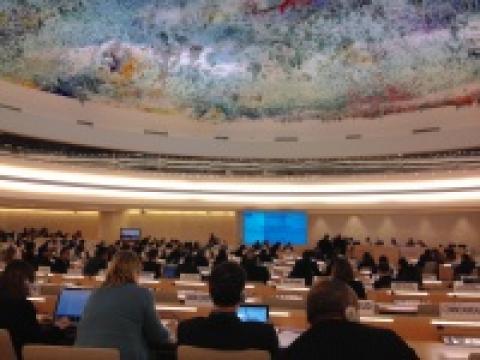Lebanon shows limited willingness to improve human rights situation

On 2 November 2015, the United Nations Member States reviewed the human rights situation in Lebanon in the context of the country’s second Universal Periodic Review (UPR) – an interactive discussion between the State under review and other UN Member States which takes place every four years. During the review, the UN Member States made 219 recommendations to Lebanon in order to improve the human rights situation in the country, most of which were based on concerns raised by NGOs, including Alkarama in its report. Last week, Lebanon presented its views on the recommendations received, accepting 130 of them while only “noting” 89.
Lebanon commits to ending torture...
In October 2014, the Committee against Torture (CAT) asserted that torture in Lebanon was "a pervasive practice that is routinely used by armed forces and law enforcement agencies for the purpose of investigation". In this regard, Alkarama welcomes the fact that Lebanon accepted over 15 recommendations on the eradication of torture, committing itself to amend its legislation so that it complies with the Convention against Torture and Other Cruel, Inhuman or Degrading Treatment or Punishment (UNCAT) and its Optional Protocol (OPCAT) to which Lebanon is a party, as well as to make efforts to eradicate torture in the country and hold perpetrators accountable.
In November 2011, a draft law establishing a National Human Rights Institution was introduced in Parliament, but remains pending before the Chamber of Deputies due to the political stalemate prevailing in the country. Over 10 States, therefore, recommended Lebanon to establish a NHRI in accordance with the Paris Principles relating to the status of NHRIs, all of which were accepted by Lebanon.
... but refuses to end the use of military tribunals to try civilians
It is worrisome that in Lebanon the Military Tribunal has competence to try civilians, even though military tribunals should not be used to prosecute civilians due to their lack of independence and impartiality, as expressed by the UN Working Group on Arbitrary Detention (WGAD) on many occasions. Furthermore, the Military Tribunal can hold trials in secrecy, or without the presence of a lawyer. Alkarama, therefore, regrets that Lebanon did not accept Hungary’s recommendation to “limit the Military Tribunal’s jurisdiction to members of the armed forces and enhance the independence of the judiciary.”
Furthermore, in its submission to the UN Member States, Alkarama highlighted that even though there is a de facto moratorium on death penalty in Lebanon since 2004, 28 death sentences were pronounced between January and February 2015 alone. In view of these facts, over 10 States recommended that Lebanon establish a de jure moratorium on the death penalty, to the effect of its total abolition; however, Lebanon did not accept any of these recommendations, showing the State’s unwillingness to change its position.
What is next?
Lebanon’s commitments will be endorsed by the UN Human Rights Council (HRC) on 16 March 2016, after which the country is expected to implement the 130 accepted recommendations, in order to improve its human rights record. Although Alkarama welcomes the positive attitude Lebanon showed during its review, it remains concerned over the fact that many important recommendations – including on military tribunals and the death penalty – were not accepted. Alkarama will closely follow the implementation of the recommendations in the country.
For more information or an interview, please contact the media team to media@alkarama.org (Dir: +41 22 734 1008).
